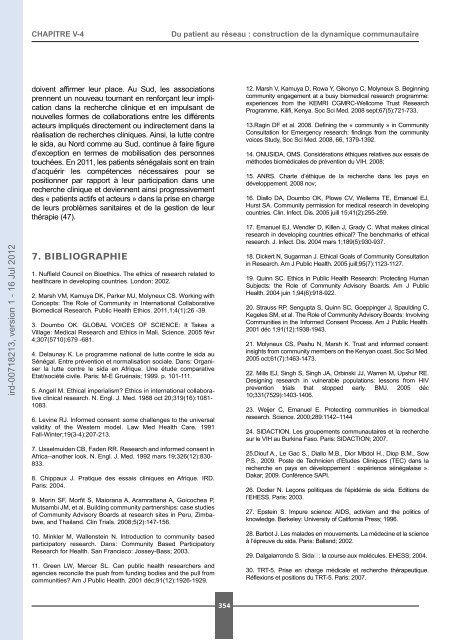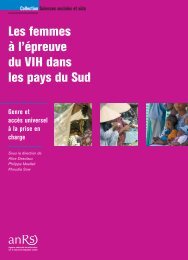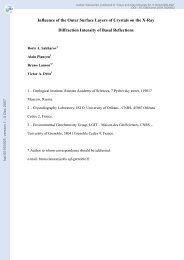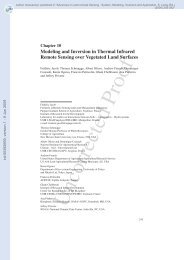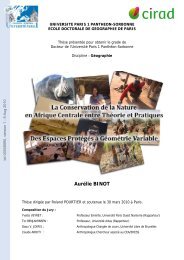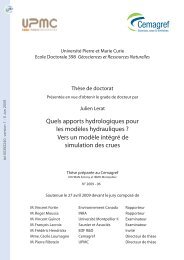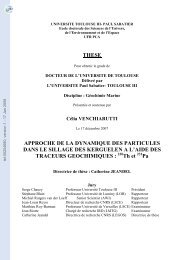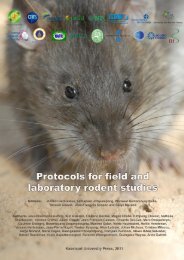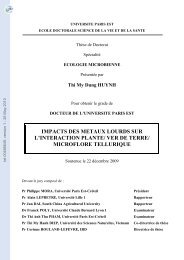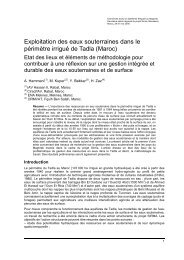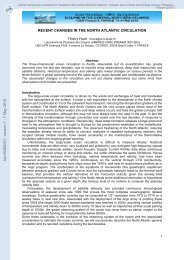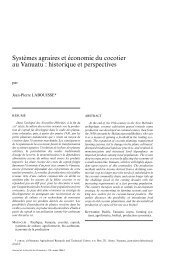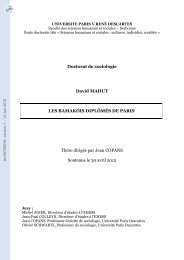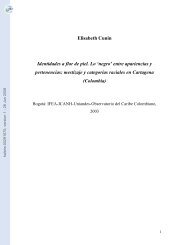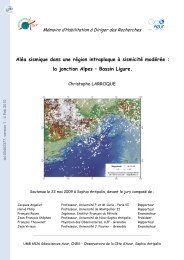Bernard Taverne, Alice Desclaux, Papa Salif Sow
Bernard Taverne, Alice Desclaux, Papa Salif Sow
Bernard Taverne, Alice Desclaux, Papa Salif Sow
- No tags were found...
Create successful ePaper yourself
Turn your PDF publications into a flip-book with our unique Google optimized e-Paper software.
CHAPITRE V-4Du patient au réseau : construction de la dynamique communautaireird-00718213, version 1 - 16 Jul 2012doivent affirmer leur place. Au Sud, les associationsprennent un nouveau tournant en renforçant leur implicationdans la recherche clinique et en impulsant denouvelles formes de collaborations entre les différentsacteurs impliqués directement ou indirectement dans laréalisation de recherches cliniques. Ainsi, la lutte contrele sida, au Nord comme au Sud, continue à faire figured’exception en termes de mobilisation des personnestouchées. En 2011, les patients sénégalais sont en traind’acquérir les compétences nécessaires pour sepositionner par rapport à leur participation dans unerecherche clinique et deviennent ainsi progressivementdes « patients actifs et acteurs » dans la prise en chargede leurs problèmes sanitaires et de la gestion de leurthérapie (47).7. BIBLIOGRAPHIE1. Nuffield Council on Bioethics. The ethics of research related tohealthcare in developing countries. London: 2002.2. Marsh VM, Kamuya DK, Parker MJ, Molyneux CS. Working withConcepts: The Role of Community in International CollaborativeBiomedical Research. Public Health Ethics. 2011,1;4(1):26 -39.3. Doumbo OK. GLOBAL VOICES OF SCIENCE: It Takes aVillage: Medical Research and Ethics in Mali. Science. 2005 févr4;307(5710):679 -681.4. Delaunay K. Le programme national de lutte contre le sida auSénégal. Entre prévention et normalisation sociale. Dans: Organiserla lutte contre le sida en Afrique. Une étude comparativeEtat/société civile. Paris: M-E Gruénais; 1999. p. 101-111.5. Angell M. Ethical imperialism? Ethics in international collaborativeclinical research. N. Engl. J. Med. 1988 oct 20;319(16):1081-1083.6. Levine RJ. Informed consent: some challenges to the universalvalidity of the Western model. Law Med Health Care. 1991Fall-Winter;19(3-4):207-213.7. IJsselmuiden CB, Faden RR. Research and informed consent inAfrica--another look. N. Engl. J. Med. 1992 mars 19;326(12):830-833.8. Chippaux J. Pratique des essais cliniques en Afrique. IRD.Paris: 2004.9. Morin SF, Morfit S, Maiorana A, Aramrattana A, Goicochea P,Mutsambi JM, et al. Building community partnerships: case studiesof Community Advisory Boards at research sites in Peru, Zimbabwe,and Thailand. Clin Trials. 2008;5(2):147-156.10. Minkler M, Wallenstein N. Introduction to community basedparticipatory research. Dans: Community Based ParticipatoryResearch for Health. San Francisco: Jossey-Bass; 2003.11. Green LW, Mercer SL. Can public health researchers andagencies reconcile the push from funding bodies and the pull fromcommunities? Am J Public Health. 2001 déc;91(12):1926-1929.12. Marsh V, Kamuya D, Rowa Y, Gikonyo C, Molyneux S. Beginningcommunity engagement at a busy biomedical research programme:experiences from the KEMRI CGMRC-Wellcome Trust ResearchProgramme, Kilifi, Kenya. Soc Sci Med. 2008 sept;67(5):721-733.13.Ragin DF et al. 2008. Defining the « community » in CommunityConsultation for Emergency research: findings from the communityvoices Study, Soc Sci Med. 2008, 66, 1379-1392.14. ONUSIDA, OMS. Considérations éthiques relatives aux essais deméthodes biomédicales de prévention du VIH. 2008;15. ANRS. Charte d’éthique de la recherche dans les pays endéveloppement. 2008 nov;16. Diallo DA, Doumbo OK, Plowe CV, Wellems TE, Emanuel EJ,Hurst SA. Community permission for medical research in developingcountries. Clin. Infect. Dis. 2005 juill 15;41(2):255-259.17. Emanuel EJ, Wendler D, Killen J, Grady C. What makes clinicalresearch in developing countries ethical? The benchmarks of ethicalresearch. J. Infect. Dis. 2004 mars 1;189(5):930-937.18. Dickert N, Sugarman J. Ethical Goals of Community Consultationin Research. Am J Public Health. 2005 juill;95(7):1123-1127.19. Quinn SC. Ethics in Public Health Research: Protecting HumanSubjects: the Role of Community Advisory Boards. Am J PublicHealth. 2004 juin 1;94(6):918-922.20. Strauss RP, Sengupta S, Quinn SC, Goeppinger J, Spaulding C,Kegeles SM, et al. The Role of Community Advisory Boards: InvolvingCommunities in the Informed Consent Process. Am J Public Health.2001 déc 1;91(12):1938-1943.21. Molyneux CS, Peshu N, Marsh K. Trust and informed consent:insights from community members on the Kenyan coast. Soc Sci Med.2005 oct;61(7):1463-1473.22. Mills EJ, Singh S, Singh JA, Orbinski JJ, Warren M, Upshur RE.Designing research in vulnerable populations: lessons from HIVprevention trials that stopped early. BMJ. 2005 déc10;331(7529):1403-1406.23. Weijer C, Emanuel E. Protecting communities in biomedicalresearch. Science. 2000;289:1142–114424. SIDACTION. Les groupements communautaires et la recherchesur le VIH au Burkina Faso. Paris: SIDACTION; 2007.25.Diouf A., Le Gac S., Diallo M.B., Dior Mbdol H., Diop B.M., <strong>Sow</strong>P.S., 2009. Poste de Technicien d’Etudes Cliniques (TEC) dans larecherche en pays en développement : expérience sénégalaise ».Dakar; 2009. Conférence SAPI.26. Dodier N. Leçons politiques de l’épidémie de sida. Editions del’EHESS. Paris: 2003.27. Epstein S. Impure science: AIDS, activism and the politics ofknowledge. Berkeley: University of California Press; 1996.28. Barbot J. Les malades en mouvements. La médecine et la scienceà l’épreuve du sida. Paris: Balland; 2002.29. Dalgalarrondo S. Sida: la course aux molécules. EHESS; 2004.30. TRT-5. Prise en charge médicale et recherche thérapeutique.Réflexions et positions du TRT-5. Paris: 2007.354


